research Projects
The department strengthens its research programs by nurturing the following research clusters: Food, Bioenergy, Environment, Biochemical and Materials Engineering.
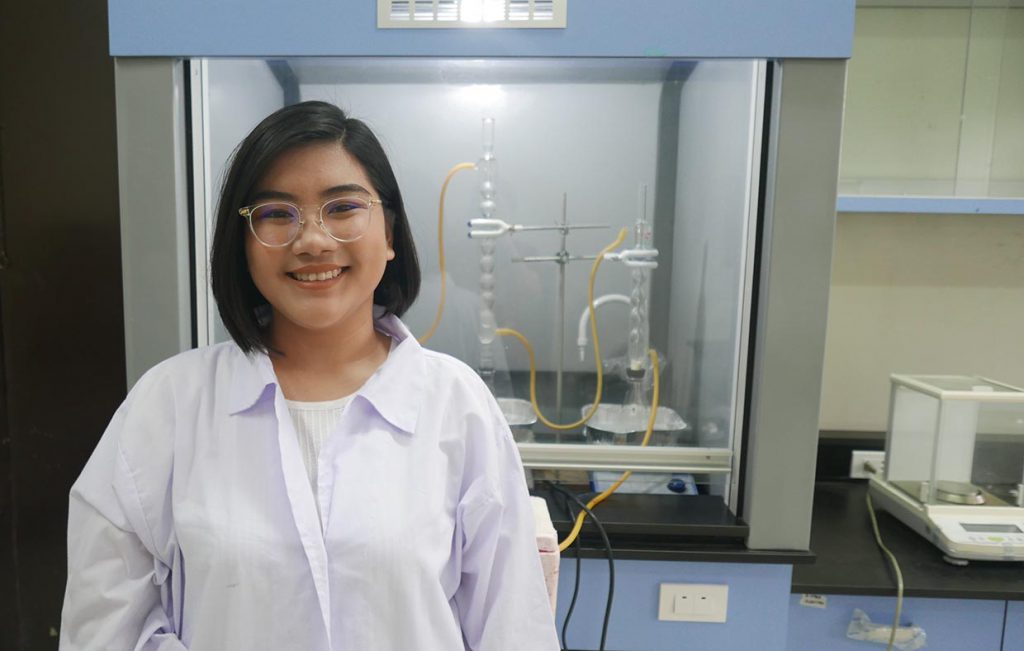
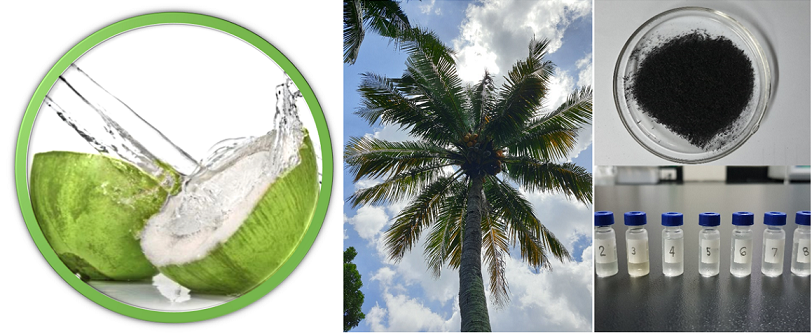
Extraction of Phytohormones from Waste Coconut Waster using Biochar Derived from Agricultural Residues
Coconut (Cocos nucifera linn.) is a key agricultural crop and major trade item of the Philippines. One of the products derived from it is coconut oil which is extracted from dried coconut meat (copra). Unfortunately, the extraction process involved generates a huge volume of wastes such as coconut husks, shells, and coconut water. In particular, waste coconut water (WCC) poses deleterious effects in the environment due to its high biological oxygen demand (BOD), and low pH value.
This three- year research project will provide a means of reducing environmental pollution due to the improper disposal of WCC while increasing value-added products in the coconut industry through the development of a low-cost, high-yield extraction procedure for phytohormones from WCC. Phytohormones are plant growth regulators which play essential roles throughout the different stages of plant growth (from seed germination, to tissue developments, and to flowering) and have been correlated to improved levels of harvest.
This project is an initial attempt to extract phytohormones from WCC using activated biochar (AC). Specifically, it aims to: (1) identify potential feedstocks for biochar production from a variety of Philippines agricultural wastes, (2) determine the optimum pyrolysis conditions for maximum production of high-quality biochar, (3) evaluate the characteristics of the ACs in terms of composition, morphology, etc, (4) conduct adsorption studies on ACs for phytohormone extraction from WCC, and (5) do pre-scale up studies of the extraction process. Additionally, it supports institutional development by enhancing the capability of the Department as a front-runner in bioenergy, waste utilization and materials innovation research through providing advanced equipment to be housed by the department’s laboratories.
Ultimately, a business model will be developed for the production of the phytohormone concentrate and activated biochar. More importantly, the established technologies are expected to be adopted by various Coconut Farmer’s Cooperatives in the Quezon Province as this will greatly address their WCC disposal problems and may also increase their revenues.
Interdisciplinary Biofuels Research Study Center
UPLB BIOFUELS TEAM’s Research: Beyond Sustainability
In support to the implementation of the Biofuels Law, the Biofuels Team emerged alongside the continued intensification of research and development programs on biofuels production. The Philippines enacted Republic Act 9367 (R.A. 9367), also known as The Biofuels Act of 2006, in its continuous efforts towards energy self-reliance, climate change mitigation and poverty alleviation. In response to the R.A. 9367 mandate, the University of the Philippines Los Banos (UPLB) formed an Alternative Energy RDE committee in July 2006. UPLB developed a roadmap on alternative biofuels feedstock that covers the period 2005-2020 including feedstock developments and conversion improvement (2005-2010), pre-commercial and commercial stages (2010-2015) and advanced by-product and waste utilization (2015-2020).
Through the years, the Biofuels Team has been pioneering research and development studies in biofuels production using alternative feedstocks such as sweet sorghum, cassava, malunggay (Moringa oleifera, L.), vutalao (Calophyllum uminophyllum), macro and microalgae, Jatropha curcas, coconut, waste cooking oil, oil palm, soybean, and napier grass, among others. With its strong foundation and experience in biofuels research, the team has strengthened its linkages and collaborative engagements with key players and different stakeholders of the biofuels industry ̶ LGUs, various government agencies and GOCCs (DA-BAR, DOE, DOST, DENR, PNOC-AFC, DA-PADCC, PCA, SRA), processors (PSMA, OPTION-MPC, EPAP), policy makers, and even with foreign counterparts in some academic communities in the USA, Canada, Australia, Argentina, India, Spain and Japan. Since the establishment of the National Biofuels Board, the team has been actively participating in public consultations, technical discussions, and policy advisory engagements for the advancement of the biofuels industry in the country.
Moreover, the Biofuels Team has reached out to farmers (from Negros, Panay, Kabankalan, Isabela, Pampanga, Surigao del Sur, Agusan del Sur, Davao Oriental) through personal interviews to assess their needs, reservations and aspirations. Their participation in alternative feedstocks production for the emerging biofuels industry was also encouraged through knowledge and skills sharing. These initiatives aided in achieving the mandate of the Biofuels Law of energy security, climate change mitigation and poverty alleviation by providing additional income and livelihood to farmers.
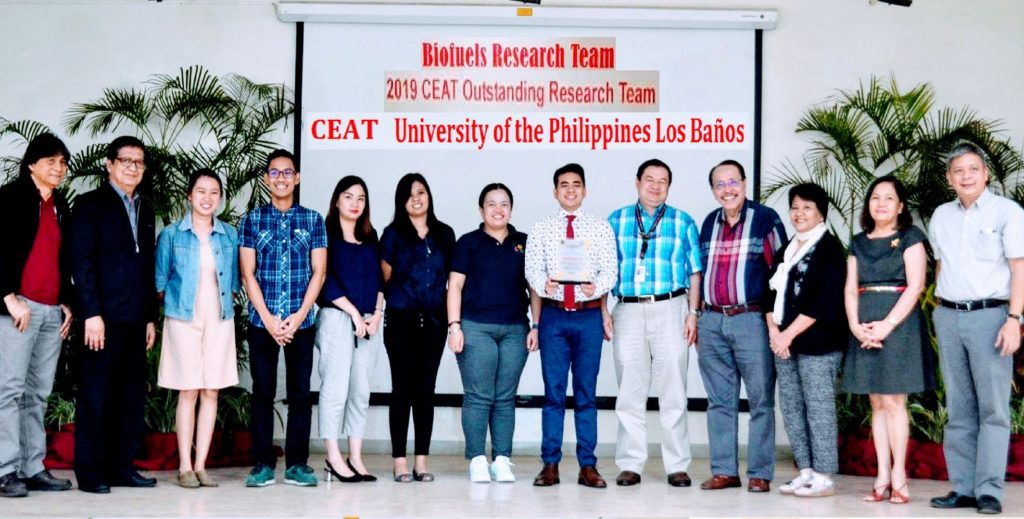

life cycle analysis PROJECTS
Life cycle analysis and sustainability assessment of different agro-industries
The research conducted water footprint assessment (WFA) on 7 selected DA’s priority crops such as coffee, cocoa, coconut, rubber, sugarcane, banana and pineapple. This is to ultimately formulate recommendations and response strategies toward water footprint reduction and sustainable water allocation and management at each specific test sites in the Philippines. Specifically, the study aims to: (1) determine site-specific total water footprint (blue, green and grey) of the seven selected priority agricultural crops; (2) determine water availability and allocation scenario in each test sites; (3) assess the sustainability of the seven selected priority crops for each test sites considering different scenarios (e.g. baseline scenario, climate change impacts); and (4) capacitate DA and other government agencies, farmers and other stakeholders on water footprint assessment through the development of an excel-based and user-friendly water footprint accounting toolkit. Water footprint assessment is an indicator of direct and indirect appropriation of freshwater resources measured over the entire supply chain. Similar to Life Cycle Assessment (LCA), it has four distinct methodological phases based from Hoekstra et al. (2011)— goal and scope setting, water footprint accounting, water footprint sustainability assessment and water footprint response formulation.
Goal and scope setting is the initial phase which sets the purpose of the study and frames scope (both spatial and temporal scale) of the subsequent steps or phases. This phase also indicates the assumptions, which data will be used and how each subsequent steps of the assessments will be approached. Water footprint accounting constitutes the bulk of the work in WFA since data collection is necessary to calculate the water footprint of specific crop within the defined scope of the study. Data collected for each location include climate and rainfall data, crop parameters, cropping pattern, soil characteristics, irrigation maps, fertilizer and pesticides application rates, crop water demand, ambient water quality standards and other distinct parameters. Water footprint sustainability assessment involves environmental sustainability, resource efficiency and equitable allocation. Information and results obtained from phases 2 and 3 shall be the basis in formulating response strategies and recommendations leading to water footprint reduction and sustainability improvement.
Water footprint assessment of these priority crops intends to evaluate environmental sustainability, resource efficiency and equitable allocation of water use within a defined spatial and temporal scale. Moreover, water scarcity and water pollution potential of these crops will also be assessed. Results of this study can provide valuable inputs on the development of efficient water management protocols and guidelines. In addition, the study targets to generate an excel-based and user-friendly water footprint accounting toolkit aimed at capacitating DA and other government agencies on a standardized water footprint assessment toward sustainable water allocation and management.
The demand for meat products has been continuously increasing in the past years with pork as the most widely eaten meat in the world (Reckman, 2013). There is a consistent market demand for livestock products to support the need of the world’s growing population. In line with this, issues regarding the harmful effects of livestock production (particularly in this study, hog raising) on the environment caught the attention of different environmental sectors. Intensification of swine farming in the Philippines causes environmental problems particularly on waste management and as reported by Briones (2005).
Given these concerns in the swine industry, this study aims to evaluate the existing swine production practices and recommend a sustainable and appropriate management that would cost-effectively lessen GHG emissions and water pollution. In order to meet this objective, this study will determine the carbon footprint or global warming potential (GWP), life cycle costing and social acceptability of existing swine production by conducting a Life Cycle Assessment (LCA). By doing so, the project will be able to identify environmental hotspots and evaluate the appropriate technology that will reduce GHG emissions that is socially acceptable at a minimal cost , thus providing data that will serve as reference in recommending the appropriate swine production system relative to GHG emissions. This project will serve as a guide for future investors, agricultural firms, and other organizations that would venture into swine production. This study may also promote effective mitigation practices for the negative environmental impacts of pig farming. It will also serve as a tool for policy makers and government agencies in generating action plans for the advancement of the swine industry.
The research project entitled, “Development of a Cost-effective and Sustainable Abaca Fiber Production in the Philippines, is an on-going study about the environmental, social, and economic impacts of the current abaca production system in the Philippines. In an aim to address the problems on the need for sustainability assessment for abaca fiber industry, this study has been initiated with the funding assistance of the Department of Agriculture – Bureau of Agricultural Research (DA-BAR). Moreover, as one of the 20 high-value crops that is regarded as priority commodities by the Department of Agriculture, there is a great potential for abaca to raise the income earning capacity of abaca producers.
The main objective of the project is to develop a cost-effective practice of producing natural abaca fiber by studying the current production practices of the top four abaca fiber producing provinces in the Philippines such as Catanduanes, Northern Samar, Davao Oriental, and Surigao del Sur. Specifically, the project aims to (1) account the greenhouse gas emissions of the four abaca production test sites; (2) determine and compare the life cycle costs of the four abaca production test sites through actual site visits, data collection, and consultation; (3) identify economic, environmental, and social hotspots, and ways of sustainably improving the current abaca production practices; (4) assess the social acceptability of adapting a cost-effective abaca fiber production practice that minimizes greenhouse gas emissions; (5) create an Excel-based tool for computing life cycle cost and greenhouse gas emissions of abaca crop from plantation to processing; (6) conduct LCA training on site assessment, data gathering, and utilization of the Excel-based tool for capacity building; and (7) establish a sustainability criterion that would serve as a benchmark for the country’s abaca fiber production.
One significant factor for determining the environmental impacts of abaca is to account for its equivalent carbon sequestration. A standard methodology for carbon sequestration accounting is being developed by the project wherein actual field sampling of considered carbon pools (above-ground biomass, below-ground biomass, ground litter, and soil organic carbon) and utilization of allometric equations are performed. It is projected that abaca fiber production in the country has the potential to reduce the greenhouse gas (GHG) emissions of the agriculture sector (30.82% Philippine GHG emission share as of 2010) or the least, is carbon-neutral. Therefore, adapting a sustainable abaca fiber production could be one of the possible climate change mitigating options of the Philippine government especially now that we are committed to reduce 70% GHG emissions by 2030 based on our business-as-usual scenario. This method shall serve as a useful tool for researchers in estimating the environmental impacts not just of abaca but of other crops as well.
With the assistance of local government units and private sectors, social acceptability of abaca producers (farmers, grading baling establishment, and traders) on the current abaca fiber production practices of are assessed though surveys. Costings of products, raw materials, fuel-use, other utilities, capital investments, employee salaries, and other maintenance and operating expenses are compiled for economic impact assessment of abaca fiber production. These data will be interpreted using Life Cycle Assessment.
At the end of the project, an Excel-based tool will be generated to account for actual carbon emission and life cycle cost of abaca. Recommendations and action plans for the Philippine abaca fiber industry will be formulated wherein a sustainability criterion will be established to serve as a benchmark for the country’s abaca fiber production.
Utilization of Waste Onion Leaves
Increasing Farmers’ Income through the Utilization of Waste Onion Leaves for
Various Applications
Onion, locally known as sibuyas, is considered as one of the most important crops because of its indispensability as a culinary ingredient. Due to its pungent aroma and sharp taste, onion is primarily used for spicing up meat, salads and vegetables. It is also a favourite seasoning and an essential ingredient in daily meals all over the country. Aside from its food applications, onions have therapeutic properties that are used to cure a wide array of diseases such as bacterial and fungal infections.
Normally, onions are harvested manually by pulling the matured bulbs. After harvest, onion roots and leaves are trimmed right away or one day after drying them under the sun. Onion bulbs are then sorted out based on their sizes and packed in red bags. While these bulbs are ready for transport to buyers or to a storage facility, the onion leaves are oftentimes left in fields and allowed to be dried under the sun. Due to lack of proper utilization, onion leaves end up as wastes in most areas. On the average, seven (7) metric tons (MT) of leaves are generated in one hectare of land planted with onion. With the total production areas for onion estimated to be 15,140 hectares, around 105,980 MT of leaves are considered as wastes causing various environmental problems since agricultural wastes being rich in organic matter get easily decomposed by the action of various microorganisms (Ligisan et. al, 2016).
With this, alongside the effort to increase the volume of production of onions, onion leaves are also targeted for its potential applications with proper research and processing. In this project, five packages of technologies (POTs), including drying, powdering, pickling, vacuum frying and juice extraction of onion leaves, were developed to produce different food products such as dried onion leaves, powdered onion leaves, pickled onion leaves, vacuum-fried onion leaves and onion leaves puree/extract. These technologies were established to preserve and enhance the shelf-life of onion leaves for further processing to produce onion leaves pandesal, kropek, noodles, tea, juice, garnish and salt/seasoning.
With the new products and technologies developed from the utilization of waste onion leaves, not only the problem on disposal of agricultural wastes was addressed. More importantly, this can potentially improve the profitability of onion farmers and increase the competitiveness of onion industry in general.
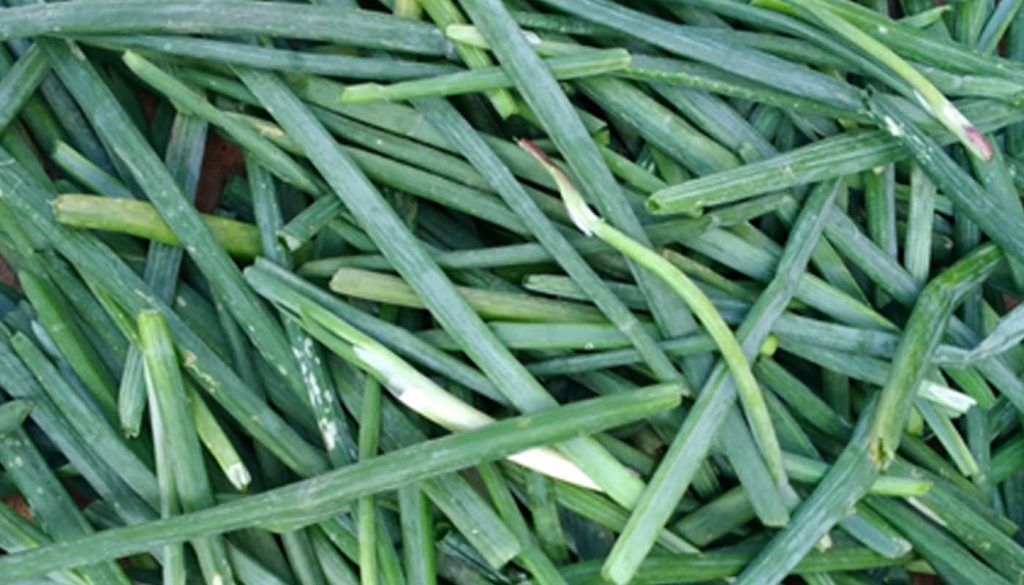
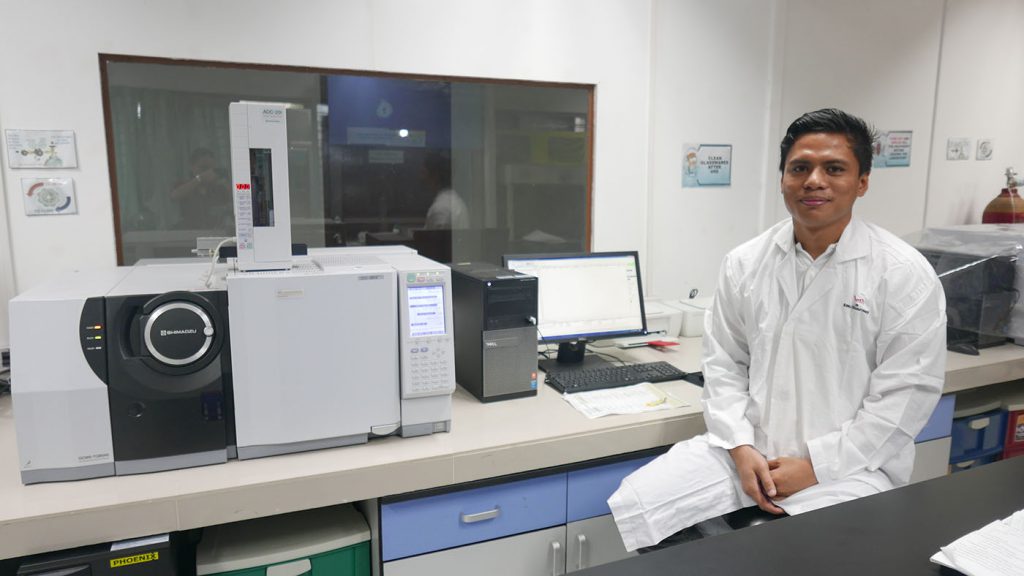
MSW waste-to-energy
Establishing a 25-kW Waste-to-Energy Facility Using a Direct Combustion Process for Municipal Solid Waste.
The two-year project will look into waste-to-energy (WTE) process by direct combustion as a possible solution to the ever-increasing municipal solid waste production in the Philippines. A technical study will be conducted by setting-up a 25-kW waste-to-energy (WTE) facility at the University of the Philippines, Los Baños (UPLB). An abandoned facility owned by the university but located 5 km from the main campus which was previously used as a sanitary landfill is being considered as a possible site for the proposed WTE facility.
The direct combustion system will be fed with solid wastes generated by UPLB constituents and is proposed to be integrated into the solid waste management plan of the University. Collection and sorting of solid waste in the campus will be coordinated with the garbage collection office of the university. This solid waste will be characterized in terms of composition and calorific value. The combustible fraction of the solid waste will be fed into a combustion chamber with a moving grate and the heat will be recovered using a steam which will be fed to a steam turbine to generate 25-kW of power. The gas emissions during combustion will be monitored using a Gas Analyser System and Gas Chromatograph-Multi Spectrophotometer (GC-MS). The technical study will primarily focus on the efficiency of energy recovery as power from municipal solid waste to assess whether a WTE direct combustion technology is feasible in the Philippines. Mitigation control steps for the gas emissions will also be evaluated to ensure the process will be environmentally acceptable.
The second year of the project will consider the economic and environmental aspect of the established WTE facility. Specifically, pre-feasibility study and life cycle analysis of a WTE plant will be conducted. Different scenarios will be tested to attain the most economically viable scheme for investors and stakeholders who are interested in setting up a direct combustion plant in the country. Financial viability of the project will be determined through calculation of Return on Investment (ROI), Internal Rate of Return (IRR), Net Present Value (NPV) and payback period. For the environmental study, Life Cycle Analysis will be conducted to assess the environmental impact of a WTE system. Carbon debt analysis and energetics will be done to determine carbon emission and energy consumption of the entire system.
Stakeholders analysis will be conducted to resolve the negative perception and social acceptability of direct combustion of wastes. The data gathered for the different components of the study will be the basis of action plans and recommendations for the project.
After the project duration, the direct combustion facility will be adopted by the University and will be proposed to be integrated in its solid waste management plan. The facility will process solid wastes generated by the University.
projects
| Project Staff | Title | Funding Agency | Year Started | Year Completed |
| Rex B. Demafelis, Kristel M. Gatdula, Victor A. Rodulfo, Jr., Lotis E. Mopera, Jose De Ramos, Lisa Stephanie H. Dizon | Upscaling the Production of Sweet Potato Products in Support to DA ALPAS COVID-19 Program | Department of Agriculture | 2020 | Ongoing |
| Myra G. Borines, Rex B. Demafelis, Jewel A. Capunitan, Wilson Tan, Glenn Baticados, Haya Faye Rivera | Commercialization of of innovative Onion Leaves Powder as Seasoning/Flavoring in Various Food Products | DA ACEF | 2020 | Ongoing |
| Rex B. Demafelis, Bernadette T. Magadia, Anna Elaine Matanguihan | Enhanced Rice Straw Biogas | UK Innovate and Research – Innovate UK | 2020 | Ongoing |
| Rex B. Demafelis, Domingo Angeles, Bernadette T. Magadia, Anna Elaine Matanguihan, Jovita L. Movillon, Butch Bataller, Canesio D. Predo, Dalisay S. Maligalig, Paul Joseph Ramirez, Kristel Gatdula | Socio-economic and Environmental Impacts of Sugar Production in the Philippines | Sugar Regulatory Administration | 2020 | Ongoing |
| Veronica P. Migo, Monet Concepcion M. Detras, Catalino G. Alfafara, Nicole Bianca J. Catli, Glenn Christian Acaso, Vencio Recio | Extraction of Phytohormones from Waste Coconut Water Using Biochar Derived from Agricultural Residues | Department of Science and Technology- Philippine Council for Agriculture Aquatic and Natural Resources Research and Development | 2020 | Ongoing |
| Rex B. Demafelis, Kristel M. Gatdula, Butch G. Bataller, Manolito E. Bambase Jr., Canesio D. Predo, Agnes C. Rola. Lisa Stephanie H. Dizon, Victor A. Rodulfo Jr., Olga C. Lomboy, Virgilio T. Villancio | Socio-economic Assessment of Implementing a Competitive Copra Pricing Mechanism for a Sustainable Philippine Biodiesel Industry | University of the Philippines Energy Research Fund | 2019 | Ongoing |
| Rex B. Demafelis, Bernadette T. Magadia, Dalisay S. Maligalig, Canesion D. Predo | Socio-economic Impact of Swine Production in the Philippines through Social Life Cycle Assessment | Department of Agriculture – Bureau of Agricultural Research | 2019 | Ongoing |
| Rex B. Demafelis, Domingo Angeles, Bernadette T. Magadia, Anna Elaine Matanguihan, Jovita L. Movillon, Canesio D. Predo, Dalisay S. Maligalig, Kristel Gatdula | Socio-economic and Environmental Impacts of Bioethanol Production (Phase II) | Sugar Regulatory Administration | 2019 | Ongoing |
| Rex B. Demafelis, Bernadette T. Magadia, Kristel M. Gatdula, Butch Bataller, Jovita L. Movillon, Lavinia Marie M. Abucay, Glenn N. Baticados, Arnold Elepano, Canieso Predo, Domingo Angeles, John Paolo Romoso | Feasibility Study for the Establishment of Commercial-Scale Sweet Sorghum Bioethanol Production System in the Philippines | University of the Philippines Energy Research Fund | 2019 | Ongoing |
| Ramer P. Bautista, Manolito E. Bambase, Jr. | Development of Oil based Thermal Treatment Disinfection Technology to Treat Infectious Waste from Healthcare Facilities | Department of Science and Technology – Philippine Council for Heath Research and Development | 2019 | Ongoing |
| Veronica P. Migo | Validation and Verification of Methods for Mineral Constituents and Heavy Metal Contaminants in Organic Fertilizers | Department of Agriculture – Bureau of Agricultural Research | 2017 | Ongoing |
| Manolito E. Bambase, Jr., Rex B. Demafelis, Ramer P. Bautista, Lisa Stephanie H. Dizon, Monet Concepcion M. Detras, Veronica P. Migo, Kristel M. Gatdula | Establishing a 25-kW Waste-to-Energy Facility Using a Direct Combustion Process for Municipal Solid Waste: A Technical, Economic and Environmental Studies | Department of Science and Technology – Philippine Council for Industry, Energy and Emerging Technology Research and Development | 2015 | Ongoing |
| Rex B. Demafelis, Lisa Stephanie H. Dizon, Kristel M. Gatdula, Victor A. Rodulfo, Jr., Bernadette T. Magadia | Life Cycle Assessment in terms of Carbon Debt and Payback Analyses, Carbon Savings and Energetics Studies of Biodiesel Production from Coconut Oil in the Philippines | National Biofuels Board through the Department of Energy | 2018 | 2019 |
| Rex B. Demafelis, Jovita L. Movillon, Lisa Stephanie H. Dizon, Bernadette T. Magadia, Amabelle A. Pector, Kristel M. Gatdula, Canesio S. Predo, Dalisay Maligalig, Lavinia Marie A. Manaig | Socio-economic and Environmental Impacts of Bioethanol Production | Sugar Regulatory Administration | 2018 | 2019 |
| Rex B. Demafelis, Lisa Stephanie H. Dizon, Bernadette T. Magadia, Pamela Joyce M. Eleazar, Domingo E. Angeles | Development of a Cost-effective and Sustainable Abaca Production in the Philippines | Department of Agriculture – Bureau of Agricultural Research | 2018 | 2019 |
| Rex B. Demafelis, Lisa Stephanie H. Dizon, Kristel M. Gatdula, Bernadette T. Magadia, Pamela Joyce M. Eleazar, Hernando Avilla | Life Cycle Assessment of Swine Production Towards a Sustainable Swine Industry in the Philippines | Department of Agriculture – Bureau of Agricultural Research | 2017 | 2019 |
| Rex B. Demafelis, Bernadette T. Magadia, Domingo E. Angeles | Sustainable Water Allocations and Management of Selected Agriculture Sector’s Priority Crops through Water Footprint Assessment | Department of Agriculture – Bureau of Agricultural Research | 2017 | 2019 |
| Rex B. Demafelis, Myra G. Borines, Manolito E. Bambase, Jr., Jewel A. Capunitan, Jovita L. Movillon, Lisa Stephanie H. Dizon, Kristel M. Gatdula | Bio-oil Production from Agricultural Waste (formerly Biojet Fuel Production from Coconut Oil) | Department of Science and Technology – Philippine Council for Industry, Energy and Emerging Technology Research and Development | 2013 | 2020 |
| Rex B. Demafelis, Manolito E. Bambase, Jr., Jewel A. Capunitan, Monet Concepcion M. Detras, Lisa Stephanie H. Dizon, Kristel M. Gatdula | Production of Biogasoline from Biomass-Derived Oils, Forest and Agricultural Machinery Fuel Utilization | Department of Agriculture – Bureau of Agricultural Research | 2014 | 2020 |
| Myra G. Borines, Rex B. Demafelis, Jeanne Michelle T. Valencia, Jewel A. Capunitan, Lisa Stephanie H. Dizon | Increasing Farmers’ Income through the Utilization of Waste Onion Leaves for Various Applications | Department of Agriculture – Bureau of Agricultural Research | 2017 | 2018 |
| Manolito E. Bambase Jr., Lisa Stephanie H. Dizon | Biodiesel Production in a Packed Column using OH – impregnated Calcium Oxide as a Heterogeneous Catayst by a Co-solvent Method | UP OVPAA – ECWRG | 2017 | 2018 |
| Rex B. Demafelis, Lisa, Stephanie H. Dizon, Kristel M. Gatdula, Bernadette T. Magadia, Anna Elaine D. Matanguihan, Elmer E. Enicola | Boosting Farmers’ Income through an Integrated Soybean Production for Food and Fuel: An Environmental Assessment, Technical and Economic Studies | Department of Agriculture – Bureau of Agricultural Research | 2016 | 2018 |
| Rex B. Demafelis, Jovita L. Movillon, Canesio S. Predo, Bernadette T. Magadia, Anna Elaine D. Matanguihan | Ethanol in the Philippines: Injecting Octane in the Bioeconomy | US GRAINS Council | 2018 | |
| Myra G. Borines, Maria Victoria P. Migo | Parametric and Optimization Studies on the Solvent Extraction of Petroleum Nut (Pittosporum resinferum) Oil | UPLB Basic Research | 2017 | |
| Rex B. Demafelis, Bernadette T. Magadia, Kristel M. Gatdula, Anna Elaine D. Matanguihan, Pamela Joyce M. Eleazar, Canesio S. Predo | Carbon Tax Policy: An Effective Driver Towards Climate Change Mitigation in the Philippines | Department of Agriculture – Bureau of Agricultural Research | 2015 | 2017 |
| Rex B. Demafelis, Lisa Stephanie H. Dizon, Kristel M. Gatdula | Saccharine Feedstocks for the Production of High Value Products | Department of Agriculture – Bureau of Agricultural Research | 2015 | 2017 |
| Domingo E. Angeles, Rex B. Demafelis | Adaptability Trial of Super Sweet Sorghum | Department of Agriculture – Bureau of Agricultural Research | 2015 | 2017 |
| Rex B. Demafelis, Kristel M. Gatdula, Bernadette T. Magadia, Veronica P. Migo | Feasibility Study on the Nationwide Deployment of Modularized Village Scale Ethanol Biorefineries using Nipa Sap | National Economic Development Authority | 2016 | 2017 |
| Rex B. Demafelis, Kristel M. Gatdula, Bernadette T. Magadia | Impact of Higher Blended Biodiesel on the Philippine Coconut Industry | National Economic Development Authority | 2016 | 2016 |
| Rex B. Demafelis, Domingo E. Angeles, Jovita L. Movillon, Arnold R. Elepaño, Butch G. Bataller, Moises A. Dorado, Apolonio Ocampo, Catalino Alfafara, Glenn Baticados, Olga Lomboy, Tomas Cabagay, Cecilia Pascual, Eric Catriz, Teodulfo Delgado, Kristel M. Gatdula | Feasibility Study for the Establishment of a Commercial Sweet Sorghum Plantation and a Sweet Sorghum Processing Plant in the Philippines | National Economic Development Authority | 2015 | 2017 |
| Rex B. Demafelis, Lisa Stephanie H. Dizon, Kristel M. Gatdula, Amabelle A. Pector | Production of Quality Grade Ethanol from Sweet Sorghum | Department of Agriculture – Bureau of Agricultural Research | 2014 | 2017 |
| Catalino G. Alfafara, Monet Concepcion M. Detras, Michael Vincent O. Laurio | Optimization of Potentiostatic Electrode-position for High Purity Silver Discovery from Scrap Jewelry- Gold Smelting Effluent in Meycauayan, Bulacan, Philippines | UPLB Basic Research Program | 2016 | |
| Monet Concepcion M. Detras | Electrolytic Recovery of Low- Grade Nickel from Ni-Rich Soil | UPLB Basic Research | 2016 | |
| Rex B. Demafelis, Jovita L. Movillon, Denise Ester O. Santiago, Kristel M. Gatdula | Process Economic Analysis, Energetics and Greenhouse Gas Reduction Potential of Bioethanol Production from Microalgae | Department of Energy | 2014 | 2015 |
| Rex B. Demafelis, Arnold R. Elepaño, Moises A. Dorado, Rodrigo R. Badayos, Butch G. Bataller, Lisa Stephanie H. Dizon, El Jirie N. Baticados, Kristel M. Gatdula, Amabelle A. Pector | Environmental, Technical, and Economic Studies of Biodiesel Production from Palm Oil in the Philippines | Department of Agriculture – Bureau of Agricultural Research | 2013 | 2015 |
| Rex B. Demafelis, Domingo E. Angeles, Emmanuel Samson, Ayn Kristina Beltran. Jerelu Ganancial, Emmanuel Samson | Site Specific Evaluation of Sweet Sorghum | Department of Agriculture – Bureau of Agricultural Research | 2013 | 2014 |
| Veronica P. Migo, Rex B. Demafelis | Bioremediation of Industrial Wastewater Containing Heavy Metals | Department of Science and Technology | 2012 | 2015 |
| Rex B. Demafelis, Jovita L. Movillon | Design, Fabrication and Operation of the Distillation Column for Hydrous Bioethanol Production | PHILRICE | 2012 | 2014 |
| Rex B. Demafelis, Kristel M. Gatdula, Amabelle A. Pector, Lisa Stephanie H. Dizon | Environmental Assessment of Community – Based and Commercial – Scale Biofuels Processing Systems Using Alternative Biofuel Feedstocks: An Effort towards Climate Change Mitigation in the Philippines | Department of Agriculture – Bureau of Agricultural Research | 2011 | 2014 |
| Rex B. Demafelis, Moises A. Dorado, Butch G. Bataller, Arnold R. Elepaño, Rodrigo Badayos, Nelson Pampolina | Establishment of Lignocellulosic Feedstock Data Bank and a Single Agriculture and Forestry Bioenergy Network | Department of Agriculture – Philippine Agricultural Development and Commercial Corporation | 2011 | 2012 |
| Rex B. Demafelis, Denise Ester O. Santiago, June Owen O. Nacorda | Technology Piloting of Microalgae as Biodiesel Feedstock | Department of Agriculture – Bureau of Agricultural Research | 2011 | 2012 |
| Rex B. Demafelis, Jovita L. Movillon, Heraldo Layaoen, Emmanuel Samson, Jerenlu Ganancial, Ayn Kristina Beltran | Commercial Sweet Sorghum Plantation and Bioethanol Processing in Collaboration with San Carlos Bioenergy Incorporated and Local Government Units of Northern Negros | Department of Agriculture – Bureau of Agricultural Research | 2011 | 2012 |
| Rex B. Demafelis, Heraldo Layaoen, Honorio Soriano, Jr., Tessie Navarro, Orlando Balderama, Gloria C. Gloria | Sweet Sorghum Validation Trials in Northern Luzon and the 2nd National Sweet Sorghum Business Summit and Plantation Showcase | Department of Agriculture – Bureau of Agricultural Research | 2011 | 2012 |
| Rex B. Demafelis, Emmanuel Samson, Domingo E. Angeles, Apolonio Ocampo, Victor Gonzales, Maria, Josephine Mercado, Roberto Salazar, Edgar Dilla, Jovita Movillon | Technology Piloting of Sweet Sorghum Through the Use of Marginal Lands in the Region of Panay: An Initiative towards Increasing Farmers’ Income and Land Productivity | Department of Agriculture – Bureau of Agricultural Research | 2011 | 2013 |
| Rex B. Demafelis, Jovita L. Movillon, Kristel M. Gatdula | Technology Piloting of Macroalgae as Bioethanol Feedstock | Department of Agriculture – Bureau of Agricultural Research | 2011 | 2013 |
| Rex B. Demafelis | Sweet Sorghum Validation Trials in Collaboration with Ethanol Players in Negros Occidental | Department of Agriculture – Bureau of Agricultural Research | 2010 | 2011 |